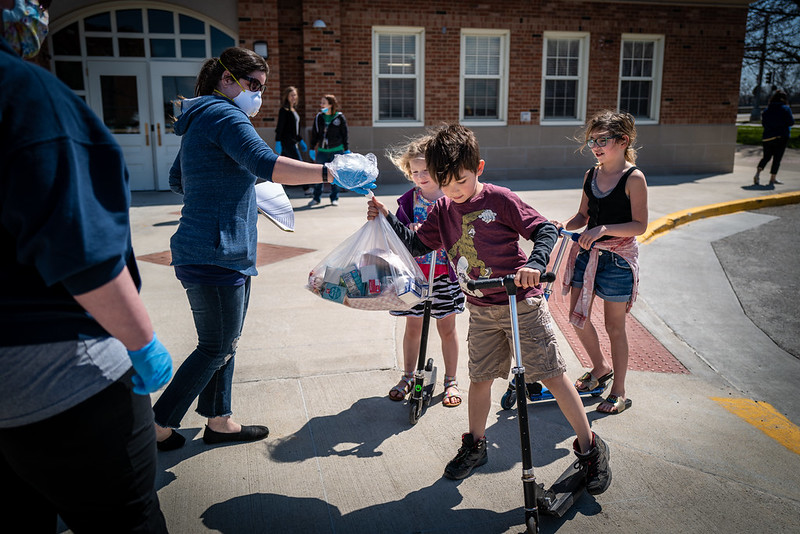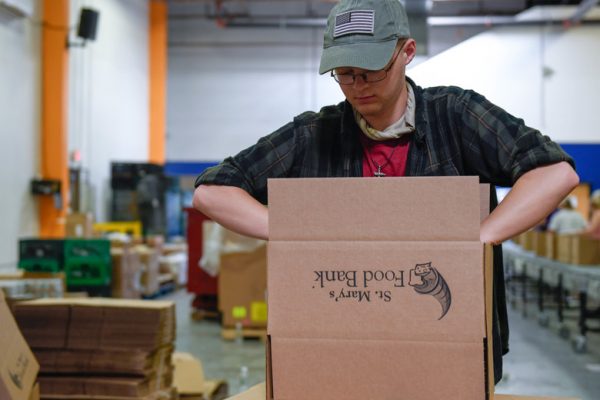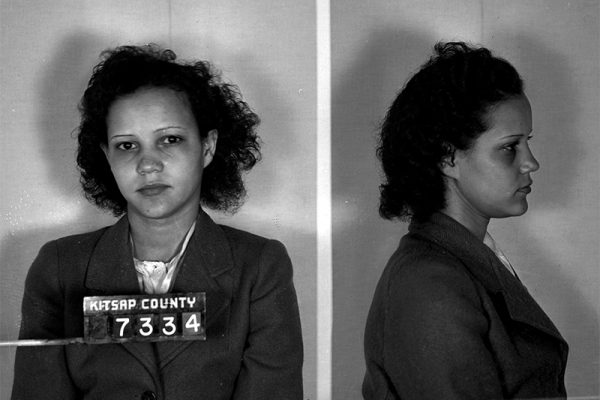The COVID-19 crisis has been a tipping point for American families. Parents are scrambling to do their jobs under rapidly changing or even dangerous conditions while caring for children and other vulnerable loved ones. Tens of millions are out of work with little sense of what jobs will return. The pandemic has magnified inequality and white supremacy in ways that make family life even harder. Black and Latinx Americans are contracting and dying from coronavirus at far higher rates than white Americans. Low-wage workers and workers of color comprise the largest share of the 40 million newly unemployed. Not surprisingly, women are disproportionately shouldering increased loads of unpaid caregiving, homeschooling, and household work resulting from school closures and stay-at-home orders.
But the conditions for the squeeze that families are currently experiencing were set long before the pandemic hit U.S. shores. The seeming impossibility of the current situation for American families is not an unfortunate byproduct of an unforeseen global health crisis. It is the inevitable result of an economic worldview that has methodically shifted more and more costs onto families’ shoulders under a façade of “family values.”
In recent years critics have placed the blame for our current economic arrangement on four decades of privatization, deregulation, and tax cuts. What has received less attention are the accompanying cultural norms for families: the heightened expectations that families will provide for their own with little public support, and the assumption, sometimes implicit, that the two-parent nuclear family is the optimal family structure to do so. The two sets of norms—one economic, one cultural—are superficially distinct but deeply intertwined. In order to emerge from this crisis stronger, we must dismantle the family norms that lie at the heart of our current failed economic approach. Only then will we see the political will to invest in the kinds of public goods—from child care to affordable higher education—that today’s American families need to survive and thrive.
It remains a daunting challenge. Neoliberalism’s resilience lies not in its empirical power—the United States has experienced less growth and economic security since 1980 than in the forty years prior—but in its political success in advancing a vastly expanded notion of what constitutes private family responsibility and enshrining it as a “reasonable” bipartisan consensus. Moreover, one of the reasons that neoliberalism has endured politically is that it has convinced many Americans that the failure to prosper in a free and unfettered market is a personal failing—a lack of virtue stemming from poor family decision-making.
This could be the moment in which such a consensus unravels, when families’ economic and time struggles become so acute and widespread that they can no longer be chalked up to poor individual choices. It is conceivable that the crisis will enable us to imagine an alternative economic future, one grounded in the recognition that families of all forms have dignity and value. Such outcomes are far from certain, but for the first time in the better part of the last half-century, they are possible. The crisis is prompting a re-examination of economic tenets that have held sway for decades. Now we must do the same for the family assumptions that played an equally powerful role in neoliberalism’s rise and resilience. And we must build the political institutions and power needed to make such a future a reality.
Neoliberalism owes its political dominance to the common bonds forged between intellectuals, political institutions, and movement leaders. Much of the political power driving neoliberalism’s rise emerged with social conservatives: the white evangelical Christian churches that, beginning in the 1970s, became increasingly politicized as a right-wing force. Neoliberal economists and social conservatives did not necessarily share a uniform view of families; as political scientist Melinda Cooper documented in Family Values: Between Neoliberalism and the New Social Conservatism (2017), the value of the family for economists was less about its innate moral virtue than its privatizing function. But Cooper’s analysis reveals how symbiotic the two camps were. Social conservatives’ reverence for the traditional nuclear family provided a values-based language to justify neoliberal efforts to dramatically erode the welfare state. And neoliberals elevated the married, two-parent family as a normative family ideal by establishing it as the basic economic unit of society—the container, so to speak, for individual economic success—and, by extension, personal virtue.
Social conservatives have not won the war of ideas when it comes to family structure; Americans today are more accepting of a wide range of family forms than at any point in history. But at the same time, the traditional family structure retains much of its cultural power due to the precarity of contemporary economic life. Thanks to a system with very little social insurance, almost no public investment in services for children outside of K-12 education, and jobs that do not pay enough to live on, individuals are in fact more tethered to families—through wealth and debt—than they were a generation ago. Families now bear near exclusive responsibility for helping provide a middle-class life for their children, through private financing of child care, an assortment of de rigueur private enrichment activities, higher education, and even eventual home ownership. As various forms of public economic support for families have been systematically eroded (e.g., cuts to public higher education, the scaling back of Pell grants) and replaced by private financing mechanisms (e.g., the expansion of private student loans), family economic ties through marriage and parenthood have been strengthened.
The net result is that family structure has become, along with race and gender, one of the prime sources of inequality in the United States. But just as a central tenet of neoliberalism is that individuals deserve the rewards and punishments they incur from largely unregulated markets, family security is framed as the result of individual choices pertaining to marriage and childbearing.
In reality, market capitalism has been advanced through a form of family capitalism that affixes different rewards and penalties to various family structures and uses the resulting discrepancies to define and reinforce the parameters of what’s “normal.” Married couples in the United States benefit from more than one thousand rights, benefits, and privileges they receive under federal law, whereas the United States attaches a particularly high penalty to single motherhood. Indeed, single mothers are more likely to be poor in the United States than they are in twenty-six of twenty-nine comparable, rich democracies. The reason that is not their “poor lifestyle choices.” Rather, it is the result of a set of policy choices, cloaked in the language of family morality, that leave single mothers more economically vulnerable in the United States than in much of the rest of the world.
Such choices do more than solidify family economic inequality; they are a tool in the maintenance of white supremacy. The policing of family structure has always been most formal and punitive for low-income black and brown families. Welfare reform of the 1990s, for example, was the culmination of more than thirty years of moralizing about “family breakdown” in black communities and the stigmatizing of black single mothers, all while simultaneously decimating black and brown families through mass incarceration and other forms of structural racism. Neoliberals—who included not just political conservatives like Ronald Reagan but also “New Democrats” like Bill Clinton—spent the better part of thirty years enacting a series of reforms designed to enforce a particular view of family morality by establishing a state interest in paternity establishment, policing child support obligations, and in the early 2000s, promoting marriage as a solution for poverty reduction. The net effect was to transform the public interest in supporting vulnerable families into a public interest in enforcing family responsibility among low-income, disproportionately black women.
For middle- and upper-middle class families, the maintenance of an illusory family ideal has been more subtle and insidious. The white, married, two-parent breadwinner/homemaker family was a social construction of the mid-twentieth century postwar era, enforced through rigid race and gender hierarchies and enabled by the family wage once paid, and the generous public housing and higher education benefits once provided, to white, largely unionized men. Over the past half century, much about families has changed. Today, 26 percent of children live with a single parent. And 61 percent of married parents with children under the age of 18 both work outside the home. Yet there has been no commensurate reduction in caregiving and household labor and few new public supports to help families manage the responsibilities that were once relegated full-time homemakers. Nor is there any formal support—in the form of tax, monetary, housing, or other policy—for the kinds of family structures that would be better equipped to manage the responsibilities of a neoliberal economy, such as extended family or fictive kin networks.
“We’re living with the household requirements of the 1960s but the work and parenting expectations of 2020, which is a rotten combination, especially for mothers,” New York Times columnist Jen Senior wrote just over a week ago. Instead, the stress parents—and especially mothers—experience from mounting economic and time pressures is framed as their individual problem to solve. “Life hacks” for greater efficiency; “self-care” in the form of consumption—the solution to capitalism run amok, we are told, is more capitalism.
It is possible that COVID-19 crisis could cause greater numbers of Americans to reject the family norms that have allowed neoliberalism to endure as a “zombie ideology,” one whose intellectual claims have overwhelmingly failed to produce. A prolonged and severe recession could cause more Americans to reject the myth that economic security is a byproduct of individual virtue and “good” family decisions. And it could well cause more families—and particularly women—to stop accepting that the unrealistic economic and time expectations placed upon them and start demanding public support.
The seeds of such a rebellion were already there. Pre-pandemic, the economic conditions resulting from neoliberal policies—stagnant wages, high inequality—combined with skyrocketing costs of child care, higher education, and health care had created new political energy for significant new public investments: paid family leave, universal child care, tuition-free college, Medicare for All, and guaranteed income. None, however, has yet broken through.
Politically, the reason for this is clear: conservatives have blocked any form of public investment for the better half of the last century, and proponents have been unable to build the political will necessary to overcome such entrenched opposition. This is in part due to is likely the resistance of primarily white middle- and upper-middle class families who have been able to get by, if even on the margins, thanks to the labor of privately paid—and often low-paid—women of color, including many immigrants. Will the current crisis finally prompt a re-examination of those interests? COVID-19 has made domestic labor less available, requiring greater numbers of affluent families to fend for themselves, while forcing domestic workers, who often lack basic labor protections, to make impossible choices between a paycheck and their personal health and safety. The fragility of the moment could help to encourage new thinking, building greater support for solutions that don’t require the exploitation of some to ensure the security of others.
Greater demand for public investment could also result from the disruption of public schools, one of the few remaining public benefits for American families. In the wake of the pandemic, vast amounts of additional unpaid labor have been added to already overburdened parents’—particularly mothers’—plates. Recent studies estimate that since the pandemic hit working parents have assumed an additional twenty-eight hours of weekly household chores and child care, with women now performing an average of sixty-five hours a week of household labor (as opposed to men’s fifty). Numbers of parents report that they are “failing miserably,” as they attempt to juggle work, parenting, and homeschooling.
The crisis has also revealed the risk of relying on private markets to provide essential family goods and services. Public schools are vulnerable to budget cuts in a post-pandemic economy, as states and localities will struggle to balance dramatically reduced budgets. But they will eventually re-open and remain intact. Meanwhile, the privatized U.S. child care market is crumbling. Most providers operate on razor-thin profit margins, and amidst widespread closures, are struggling to cover rent and pay staff. The child care shortages and cost hikes that will likely greet families as local economies begin to re-open (in order to compensate for lower teacher-student ratios that will be necessary to comply with social distancing regulations) could have spiraling negative economic effects, reducing mothers’ employment and career advancement prospects for years to come. And amidst a prolonged recession or depression, the already crippling higher education debt load millions of young people and their families have been forced to incur may become a permanent barrier to the middle-class. A public system that bears no responsibility for family health and security is, quite simply, untenable, especially at moments of great peril.
The open question is whether the pandemic will serve not merely a personal tipping point but also a political one that builds the political will for an alternative economic approach. Such realignment is possible, but barriers remain.
First, it is difficult to overstate the degree to which neoliberals have succeeded in convincing the public—particularly political, policy, and media elites—that their particular form of family values are just a matter of common sense. This has been especially true in the social commentary around family structure, where the talking point that “children do best with two married parents” remains relatively unquestioned, despite the fact that the most rigorous reviews of existing research have found the “literature lacks a clear consensus on the existence of a causal effect” and that “any such effect is small.” It is impossible to identify with certainty why the idea remains so persuasive, though like much of neoliberal economics, conservative foundations with a vested interest in the promotion and maintenance of the ideology have invested heavily in efforts to popularize it. And for many elites, who are themselves more likely to have families resembling the ideological ideal, the claim likely has a certain self-serving appeal.
Second, there is no organic political counterforce comparable to what white, evangelical Christian churches provided to neoliberalism. There is excellent progressive organizing across the country, though progressive funders have tended to engage with it—and resource it—through the lenses of political constituencies to be mobilized and siloed policy issues to be advanced. In reality, what is needed is a set of political institutions, united by a set of values and a moral understanding of the economy as a means of promoting human thriving, not growth. Promising models exist in the form of organizing with domestic workers, mothers, and other progressive faith-based communities that are centering caregiving and caregivers, especially the most vulnerable, and building multi-racial political bases for greater public investment. But we have yet to fully imagine, never mind build, the infrastructure that the moment requires.
But as the contours of an alternative economic paradigm become clearer, we can also begin to envision the view of families it would enable. There is a possible future in which the public interest in families would actually support the care they provide, not extract it in the form of unpaid labor—and in which the dignity and value of families would be affirmed in an expansive range of forms, not privileging one at the expense of others.
The path to getting there is neither simple nor easy. But the urgency is there. One necessary step in the long journey is to recognize that this health and economic crisis is also a family crisis, meaning that it is rooted in a view of family that is unworkable on its own and prevents us from truly tackling the problems of the pandemic and the problems of our politics.









